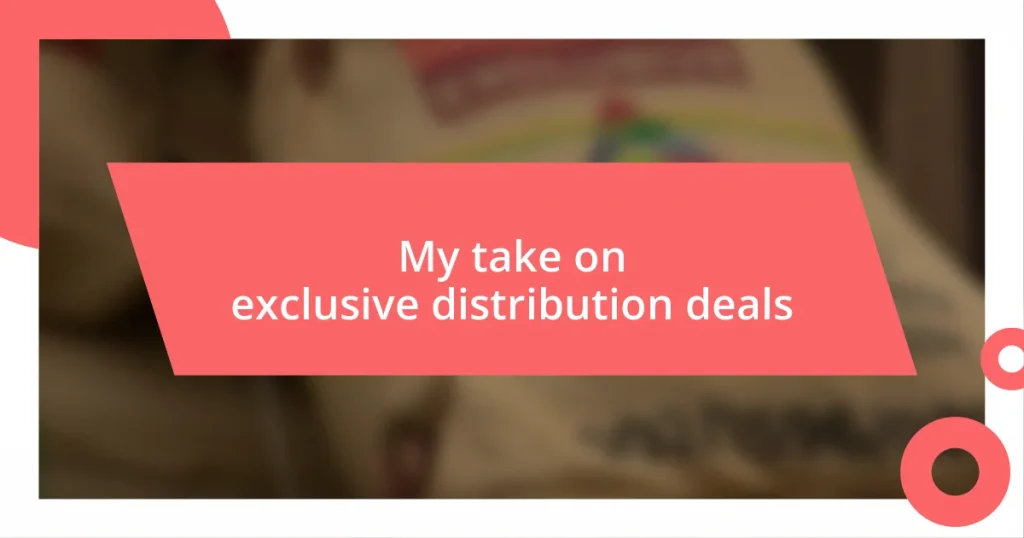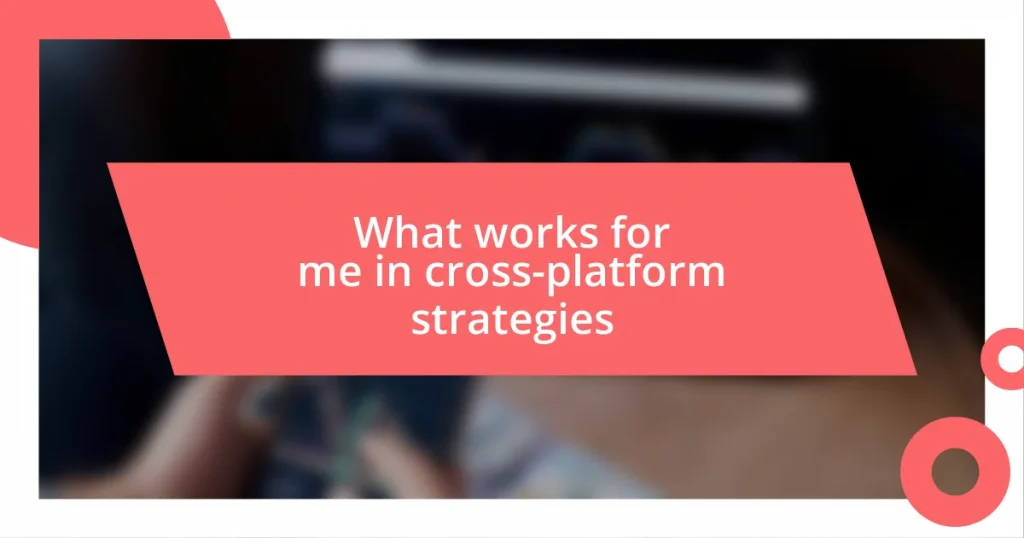Key takeaways:
- Exclusive distribution deals can enhance brand loyalty and market presence, but reliance on a single distributor can create vulnerabilities.
- Effective contract negotiation should focus on shared goals, clarity, and flexibility to foster a strong partnership.
- Regular performance evaluations and open communication are vital for maintaining exclusivity and promoting accountability between suppliers and distributors.
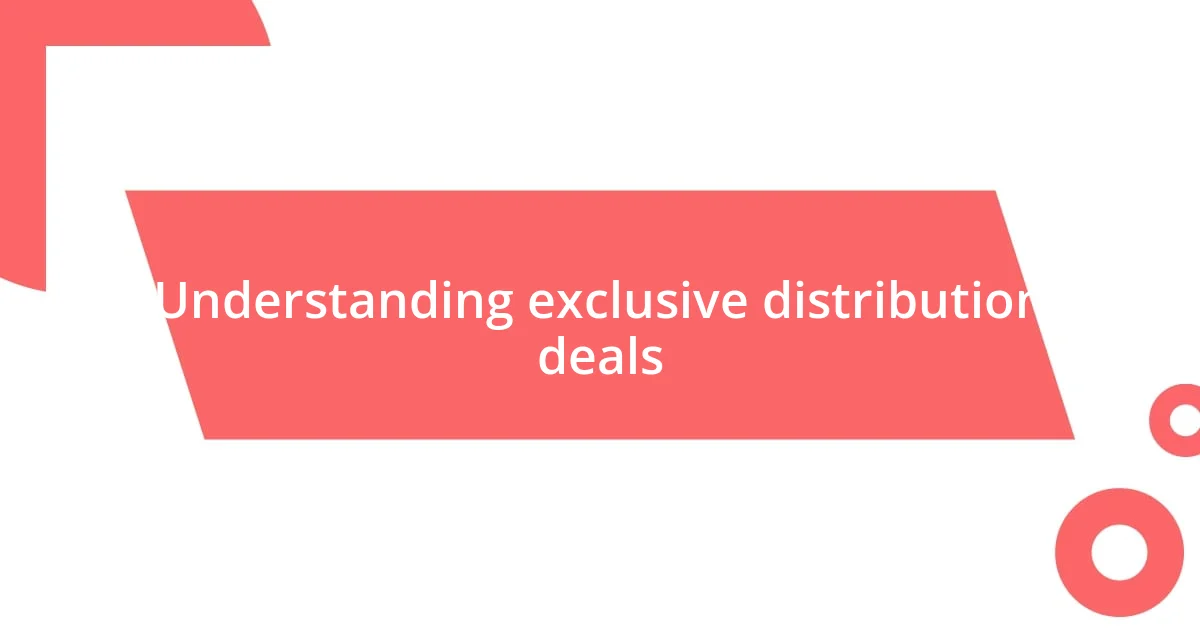
Understanding exclusive distribution deals
Exclusive distribution deals are agreements where a supplier grants a single distributor the right to sell its products within a defined area. I remember when I first came across one of these deals in a previous job; it was eye-opening to see how a well-placed partnership could elevate a brand’s presence in a competitive market. Have you ever thought about the advantages of exclusivity? It can create a sense of scarcity that often drives consumer demand.
In my experience, these deals often come with stringent terms, encouraging the distributor to heavily invest in marketing and promotion. This kind of commitment can forge a strong relationship between the supplier and distributor, where both parties feel like they’re invested in each other’s success. It’s fascinating how trust becomes a vital currency in these agreements, don’t you think?
Furthermore, exclusive distribution can also pose risks. If the distributor underperforms, the supplier might struggle to regain control of their product’s market presence. I once saw a situation where a company was heavily relying on a single distributor that faltered, leading to significant loss in visibility and sales. It’s certainly a high-stakes game that requires careful consideration and trust.
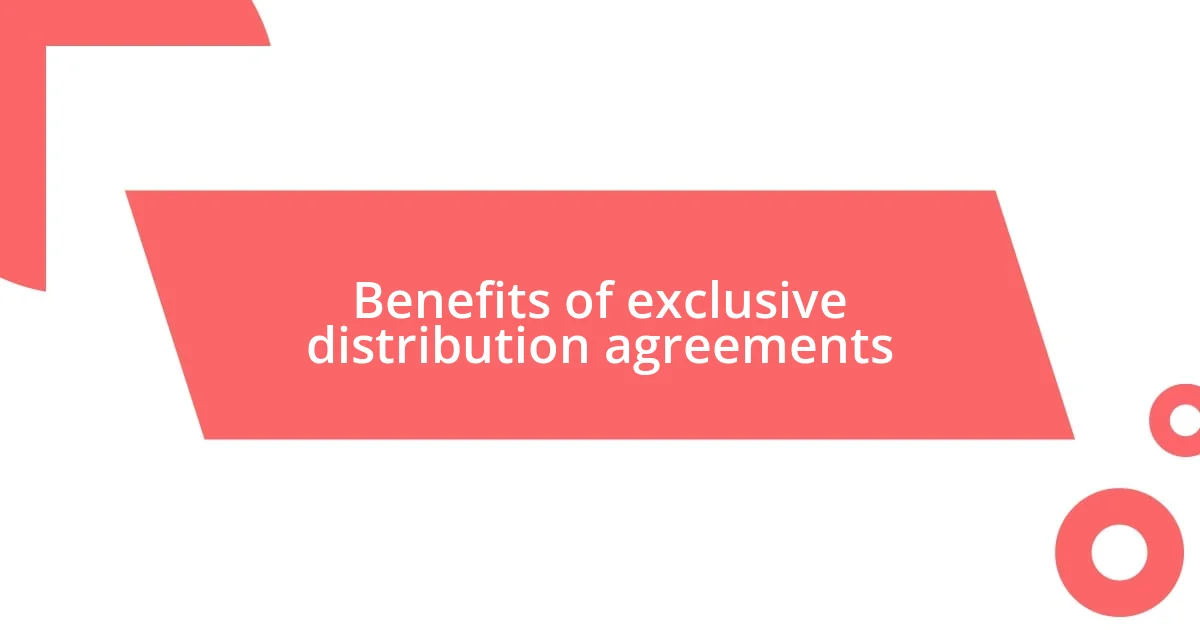
Benefits of exclusive distribution agreements
The benefits of exclusive distribution agreements can be quite compelling, especially when I reflect on the dynamics I’ve seen unfold. One major advantage is that these agreements often lead to increased brand loyalty. When a distributor has exclusive rights, they are usually more motivated to promote the brand, which can evolve into a deeper connection with consumers. I remember witnessing a product launch that thrived because the distributor poured resources into creating strong local campaigns, transforming typical buyers into brand advocates.
Here’s a closer look at some key benefits:
- Focused Marketing Efforts: Distributors can concentrate their resources on a single brand without distraction, resulting in more impactful campaigns.
- Stronger Distributor Commitment: Their exclusivity often drives a deeper investment in marketing and customer service.
- Improved Supply Chain Control: Suppliers have greater control over pricing, inventory, and logistics, ensuring consistency in the market.
- Enhanced Market Position: An exclusive distributor can effectively establish the brand as a leader in that area, elevating its overall market perception.
- Reduced Competition: With a single distributor in place, the supplier can mitigate the risk of price wars and brand dilution.
The way these elements come together can truly shift the trajectory of a brand. In my previous work, I saw a particular brand flourish because the distributor wasn’t just selling products; they were building a community around the brand, which ultimately amplified sales and customer loyalty. It’s remarkable how exclusivity can turn a business relationship into a partnership rooted in shared goals.
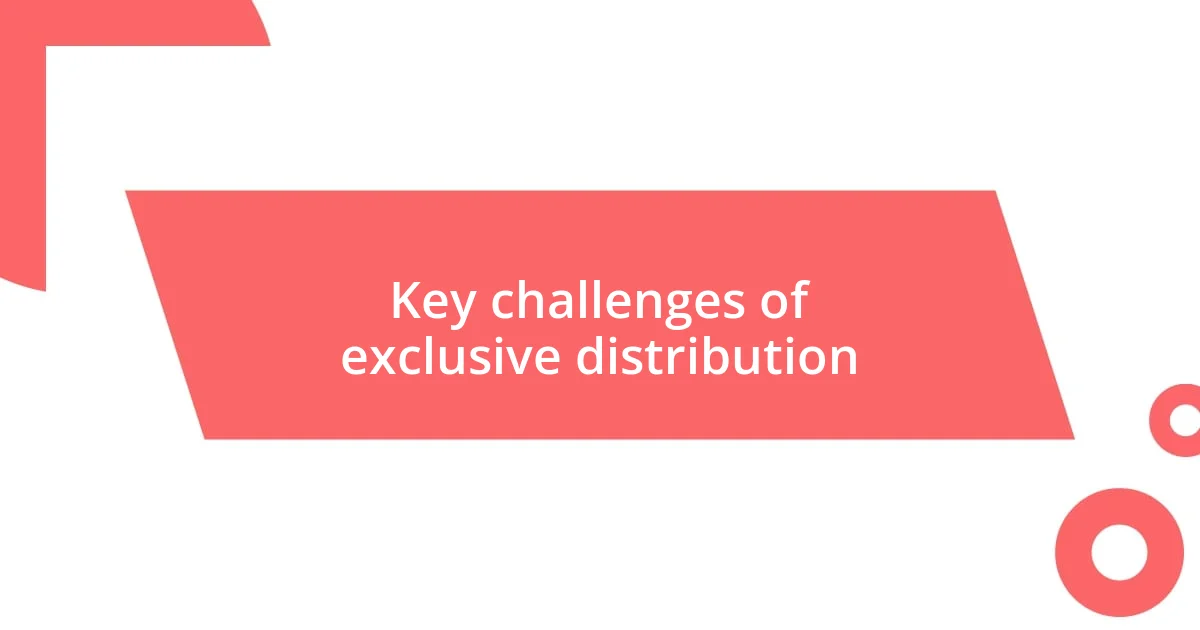
Key challenges of exclusive distribution
When considering the key challenges of exclusive distribution, one significant issue that often surfaces is dependency. Relying on a single distributor can create vulnerabilities. I recall working with a brand that tied its success to one distributor’s efforts. When that distributor faced financial difficulties, the brand saw sales plummet. It’s a sobering reminder that heavy reliance on one partner can backfire unexpectedly.
Another challenge is the potential for conflict between suppliers and distributors. Misaligned expectations can create tension, especially if the distributor doesn’t meet sales targets or engages in practices that the supplier frowns upon. In one instance, I witnessed a situation where a distributor, thinking it was adding value, started offering discounts that undercut the brand’s perceived value. It caused friction that was ultimately damaging for both parties.
Furthermore, managing market coverage can be tricky with exclusive deals. Often, a supplier may overlook opportunities to expand into new areas because they feel obligated to their exclusive partner. I once spoke with a supplier who was wary of exploring additional markets because they didn’t want to offend their exclusive distributor, even though there was potential for growth. It’s a balancing act that requires continuous dialogue and strategic planning.
| Challenge | Description |
|---|---|
| Dependency | Heavy reliance on a single distributor increases vulnerability. |
| Conflict Potential | Misaligned expectations can create friction between suppliers and distributors. |
| Market Coverage | Exclusive agreements may hinder expansion into new territories. |
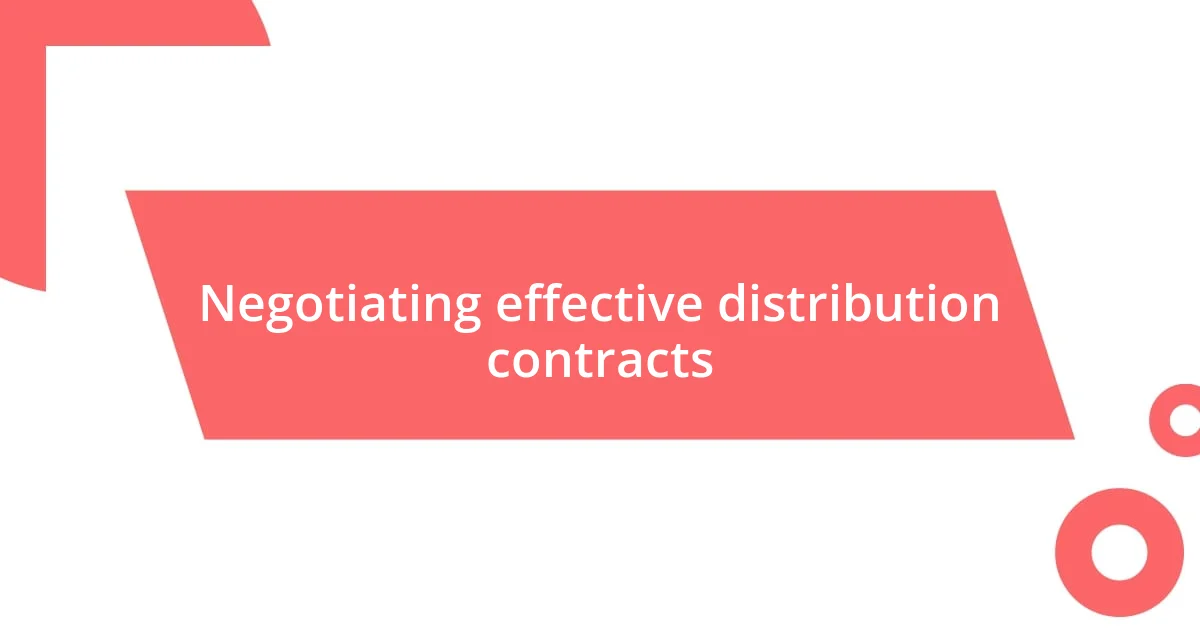
Negotiating effective distribution contracts
Negotiating effective distribution contracts is as much about establishing a strong relationship as it is about the terms laid out. I remember a time when we had to renegotiate a contract, and instead of just focusing on the bottom line, we emphasized shared goals and mutual benefits. This approach not only led to better terms but also fostered a collaborative spirit that enhanced our partnership.
When laying out the terms, clarity is crucial. I’ve seen contracts that were stuffed with legal jargon, leaving both parties confused and frustrated. It’s important to spell things out simply. I advocate for open discussions where both sides can voice their priorities. This often brings to light important topics like performance metrics and marketing commitments. Have you ever felt like you were signing a deal without truly understanding it? That sense of uncertainty can undermine trust.
I also believe in being flexible during negotiations. There was a situation where a distributor proposed changes that initially seemed unattractive. However, by being open to their ideas, we found a middle ground that ultimately benefited both parties. It’s a reminder that negotiation isn’t just about winning a deal but about crafting an agreement that respects each party’s interests and lays the groundwork for long-term success. How often do we get caught up in our perspective without considering the other side? Embracing that other viewpoint can often lead to surprising and fruitful solutions.

Best practices for maintaining exclusivity
To maintain exclusivity in distribution deals, communication is key. I’ve often found that regular check-ins with the distributor not only strengthen our partnership but also keep everyone aligned on goals and expectations. It’s a bit like tending to a garden; you need to ensure that both sides are nurtured to prevent any weeds of miscommunication from taking root.
In another experience, I learned the importance of clear performance metrics. When a distributor knows exactly what is expected of them—be it sales targets or marketing initiatives—there is less room for ambiguity. I remember a situation where we set up quarterly reviews based on these metrics, and it made a world of difference in accountability and motivation. Have you ever tried measuring success without a clear benchmark? It’s frustrating and uncertain for everyone involved.
Lastly, offering incentives can be a game changer. I’ve had success implementing tiered rewards for distributors who exceed sales goals, which creates an exciting competition and encourages them to push beyond their limits. It’s amazing how a little recognition can have a ripple effect on sales performance. Have you thought about how powerful motivation can be in your own partnerships? It really shows how maintaining exclusivity is not just about the contract, but building a rewarding relationship.
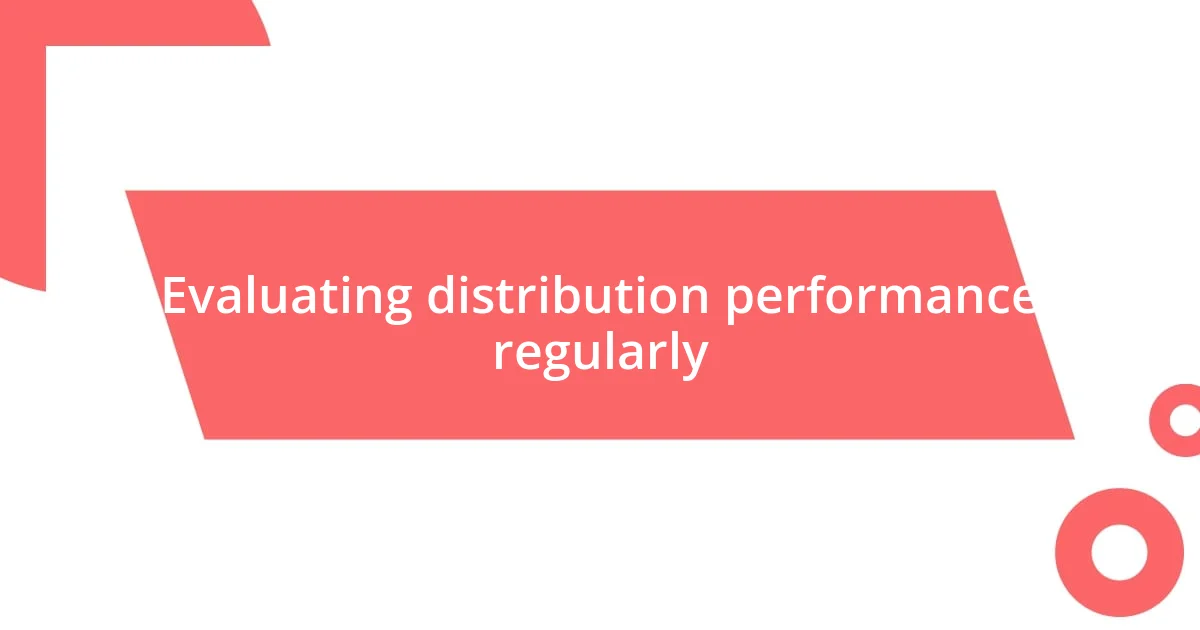
Evaluating distribution performance regularly
Evaluating distribution performance regularly is essential to ensure that both parties are meeting their obligations and expectations. I recall a time when I implemented a monthly review process with one of our distributors. During these sessions, we not only analyzed sales figures but also discussed what strategies were working and what needed adjustment. Have you ever noticed that some issues only become apparent when you look at them closely over time? It’s truly enlightening.
Setting actionable performance metrics allows for more insightful evaluations. For example, there was a period when our sales dipped unexpectedly, and through our regular assessments, we identified that the distributor wasn’t leveraging marketing resources adequately. This revelation led us to tweak our strategy and collaboratively brainstorm new marketing initiatives. Have you experienced the panic of declining sales without an apparent reason? Regular evaluations can transform confusion into clarity, allowing for proactive rather than reactive solutions.
Moreover, fostering an environment of open feedback during evaluations is crucial. I remember opening the floor to suggestions from the distributor, and it turned out they had valuable insights about customer preferences that we hadn’t considered. This collaborative investigation often leads to discovering opportunities for growth. How often do we dismiss others’ perspectives without realizing they see things we might overlook? Establishing this dialogue can enhance not only performance metrics but also strengthen the overall partnership.










